Cellist Ailbhe McDonagh shares why she and Katie Tertell decided to undertake this mammoth task and how the project has created an educational resource for teachers and students learning the works
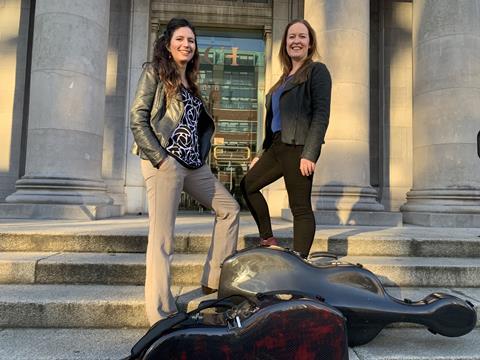
Discover more Featured Stories like this in The Strad Playing Hub.
The wonderful partnership between Katie Tertell and myself as Cello Power began while playing with the National Symphony Orchestra of Ireland. When we discovered a shared love of cello nerdiness, we decided to set each other practice goals. It all began with the Piatti Caprices. The idea was to learn one caprice every month, perform the piece to each other and then to follow this by discussing practice tips and ways to improve. When the Covid-19 pandemic hit, Katie proposed an ambitious target: to tackle all of the Popper Etudes in one year, while broadcasting our progress live on an online platform, complete with discussion and practice tips.
I had not learned many Popper Etudes during my cello studies. I had used the Carl Flesch scale system along with a collection of other studies. Taking on a project like this was a daunting challenge as most of the etudes were new material for us and would have to be performance ready in one week. I liked the idea, however, of learning all of the Popper Etudes but particularly liked the idea that I had to show up prepared with a friend and colleague for a live play-through and discussion each week. The timing, in the midst of the pandemic, allowed me to dedicate ample time to the venture, ensuring that my cello technique would be in superb shape for future performances.
Embarking on this project without fully comprehending its difficulties turned out to be a blessing in disguise. Both of us soon realised that the project was far more challenging than we had anticipated. The mental and physical strain we endured was beyond what we could have imagined. I’m not sure our respective partners knew what they were signing up for either!
We began the project with our first etude (no.40). Katie was based in England while I was in Ireland. We used a platform Katie discovered called StreamYard which, unlike other platforms, had no sound delay. This allowed us to have seamless conversations without missing a word. We did a mic soundcheck (which took an eternity in the first few videos!) and then started the live recording. Afterwards, Katie edited the video and cut out any unnecessary gaps, stories, etc. Katie seriously honed her skills in video-editing throughout the year.
Each video has the same format. Firstly, we discussed how we got on during the week: what areas of the etude we found challenging and how best to approach those. Having two different teachers/performers discuss their approaches is fascinating. We both learned from each other and added more practice tools into our arsenal. We talked about moments we enjoyed in the etude, things to watch out for and finally performed it live to each other (across the internet!)
The initial live performances were pretty intense. The last time that most cellists played a Popper Etude to anyone was probably to their teacher in college. The idea that the live video would eventually be uploaded to YouTube added both fear and motivation. The aim of the whole project was to showcase the process of practising rather than presenting a flawless final product. There are plenty of videos of the finished product online already. We wanted to provide a practice resource for people who are learning the etudes. It was important to us to pull back the curtain on how to practise, give some tips on how to speed up the process and hopefully have some fun along the way.
As we progressed through the etudes, we had to be very careful not to give ourselves an injury. Typically, musicians spend months gradually strengthening their hands when tackling an Etude. We didn’t have that luxury but did try to plan one of the trickier etudes one week followed by an easier one the following week in order to give our body the required rest. What did happen was that we both had to become much more efficient at how we practised. One cannot jump into spending four hours practising octaves as it will result in an injury so instead we had to practise with a smarter, faster method in a very relaxed manner. Sometimes ‘almost ready’ had to be good enough. Stretching exercises became a major part of our day.
A wonderful part of the process was when we invited a number of colleagues to join us as guests. Each guest brought their own particular approach to one etude and it was fascinating. We were delighted to be joined on a number of occasions by cellists Martin Johnson, Christian Elliott, Madeleine Kabat, Tim Gill, Eric Kutz, Saeunn Thorsteinsdóttir, Erin Ellis and Joely Koos. We would like to thank them for their wisdom, enthusiasm and general bravery in joining us as part of this crazy project. All of us agreed how scary it was to perform a Popper Etude live to other cellists.
Since Katie and I often found ourselves on different continents during the year, we had to adapt to recording sessions late at night or early in the morning. It was a wonderful way to access the feeling of adrenaline you would get in concerts. It was particularly intense for the first few sessions until we started feeling more familiar with the process. It was a concern for me that after the pandemic, management of adrenaline would be difficult after performing only live streams for months. Following the Popper Project however, nothing seems difficult anymore and that is the real success.
Following the Popper Project however, nothing seems difficult anymore and that is the real success
As we delved deeper into the project, we began to recognise patterns and techniques in Popper’s compositions. The Etudes no longer felt as overwhelming once we identified these recurring elements. However, the short timeframe of one week wasn’t sufficient for a thorough exploration of many of the Etudes. For the more challenging ones, we planned them multiple weeks ahead to build hand strength. For other weeks, each of us often started practising the next Etude immediately after recording the previous week’s performance.
It really was a pressurised time. I was performing a weekly livestream concert with the NSO and at every break, I practised Popper. The lockdown restrictions started lifting halfway through the year and that’s where it really became a marathon. Both Katie and myself were performing more and more and this left very little time for Popper practice. Katie even started a chamber music festival (Appalachian Chamber Music Festival, USA) during that year and our project continued despite that.
Once we had completed the project, we did notice huge benefits. We mentioned that our piece learning became decidedly faster and much more efficient. Our technique (which we felt was pretty solid to begin with) became even stronger. We both had increased finger strength and bow control, shifting ability, speed etc. No concert ever felt as pressurised as did those days performing Popper Etudes to other cellists! Even in the weeks where we were insanely busy outside of the project, learning the notes for concerts became much easier and far less time consuming. I found this fascinating as I had always thought of myself as a fast note-learner but my skills had improved even more.
When we reached the end of our project year and finished off our last etude, we celebrated with champagne. Our partners did too as they were also delighted. I’m sure everyone knows how unpleasant it is to listen to someone starting to learn a Popper Etude! We were surprised by the fact that so many of them are beautiful little pieces in themselves and really quite satisfying once they have had some time, love and attention.
After the project’s conclusion and a well-deserved break, we decided to transform our experience into a free resource for teachers and students. We uploaded all 40 videos onto YouTube and also created the website www.popperetudes.com. This was no mean feat as we had to write descriptions for each etude, decide its level of difficulty (which is completely subjective depending on what techniques you personally find challenging) and organise the videos.
On this website, you can search each video either by etude number, by its level of difficulty or by specific technique! For example, if you search for octaves, every etude featuring substantial octaves will come up. Or if you are trying to decide which etude to learn next, have a look to see what level of difficulty you would like to choose – we have laid out a plan that we based on our own practice. We really hope that this is a useful resource for people going forward.
Last year I recorded all of the solo Bach Suites in six days. Many people record them over two separate recording times because it is so physical on the hands. I’m convinced that the Popper Project was the reason I was strong enough and fit enough to be ready for it. Having finished the challenge, Katie and I are now more resilient, stronger, more efficient and generally fearless when it comes to cello playing. If you are looking for a challenge, I can highly recommend this one to you.
Ailbhe and Katie run Popper workshops and are available for masterclasses worldwide.
Ailbhe McDonagh - Royal Irish Academy of Music www.ailbhemcdonagh.com
Katie Tertell - Durham University www.katietertell.com
Read: ‘Good grief, there are 40 of them!’ - Alexander Baillie on Popper studies
Read: ‘I value them as supremely sharp tools’ - Colin Carr on Popper studies
Read more Featured Stories like this in The Strad Playing Hub
The number one source for playing and teaching books, guides, CDs, calendars and back issues of the magazine.
In The Best of Technique you’ll discover the top playing tips of the world’s leading string players and teachers. It’s packed full of exercises for students, plus examples from the standard repertoire to show you how to integrate the technique into your playing.
The Strad’s Masterclass series brings together the finest string players with some of the greatest string works ever written. Always one of our most popular sections, Masterclass has been an invaluable aid to aspiring soloists, chamber musicians and string teachers since the 1990s.
This year’s calendar celebrates the top instruments played by members of the Australian Chamber Orchestra, Melbourne Symphony, Australian String Quartet and some of the country’s greatest soloists.

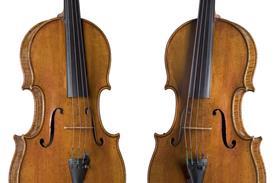


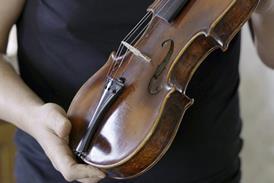




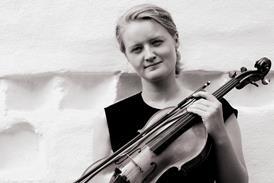














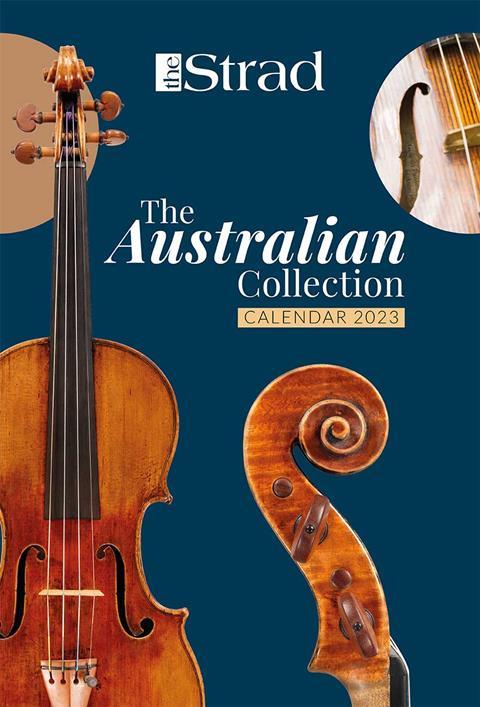












No comments yet